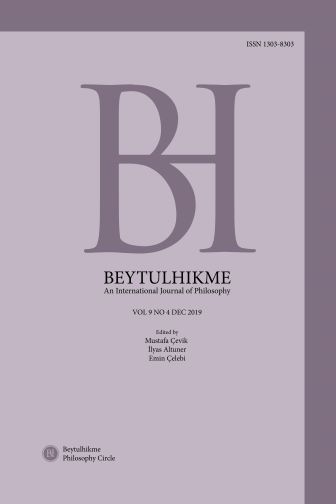Author :
Abstract
Ruhsal hastalıklar ve bunları tedavisi meselesinin kaynağını Antik Yunan filozoflarından Platon, Aristoteles ve İslam filozoflarından Ebu Bekir er-Razi, İbnü’l Cezvî, olmak üzere birçok filozof bu mesele ile ilgilenmiştir. İslam felsefecileri, ruhsal tıp meselesi nefsten hareketle ahlak felsefesinin merkezine yerleştirerek psikolojik bir zeminde temellendirmeye çalışmışlardır. Celâleddin ed-Devvânî, felsefeyi nazari ve ameli olarak ikiye ayırarak ahlak felsefesi daha çok ameli felsefe bağlamında ele alarak onun yetkinliğinden ahlaki eylemlerin itidalinden bağlamıştır. Bu yetkinliğin oluşması ise faziletleri koruma ve ahlaki hastalıkları ortadan kaldırma şeklinde tanımlanabilir. Alışkanlıklar sonucu nefste yerleşen bu hastalığın tedavisi için nefsin ifrat ve tefritten uzak tidal üzere olması gerektiğini açıklar. Devvânî, şaşkınlık, cehalet, öfke, korkaklık, şehvet, hüzün, hased gibi hastalıkları ruhsal tıp açısından ele alarak tedavi yollarını önermiştir.
Keywords
Abstract
Plato, Aristotle and the Islamic philosophers Abu Bakr al-Razi, Ibn Al-Jawzi, are among the philosophers who were concerned with the mental illnesses and their treatment. Islamic philosophers attempted to approach to the issue of spiritual medicine from a psychological perspective, by centering the issue within the moral philosophy. Jalal al-Din al-Dawani, by classifying philosophy into its theoretical and practical aspects, dealt with the moral mostly in the context of practical philosophy. Morality can be defined as protecting virtues and eliminating moral diseases, which explains that for the treatment of this disease, which dwells in soul as a result of habits, the soul should be for sobriety, and away from any extremity. Dawani treats astonishment, ignorance, anger, cowardice, lust, sadness, as spiritual illnesses and proposes his ways of treatment.
Keywords
- Adamson, P. & Taylor, R. C. (2007). İslam Felsefesine Giriş. (Çev. C. Kaya). İstan- bul: Küre Yayınları.
- Anay, H. (1994). Celâleddin Devvânî Hayatı, Eserleri, Ahlak ve Siyaset Düşüncesi. (Dr. Tezi). İstanbul: İstanbul Üniversitesi SBE.
- Aristoteles (2001). Ruh Üzerine. (Çev. Z. Özcan). Bursa: Alfa Yayınları.
- Bayrakdar, M. (1985). The Spiritual Medecine of Early Muslims. The Islamic Quar- terly, 29.
- Devvânî, C. (1989). Risâle der Tahkîk-i Adâlet. (Thk. N. M. Herevî). Mecmûa-i Resâil-i Hattıy-i Fârisî. Meşhed.
- Devvânî, C. (2019). Ahlâk-ı Celâlî. (Çev. E. Okumuş). Ankara: Fecr Yayınları.
- Fârâbî (1983). Kitâbü Tahsîlî’s-Saâde. (Nşr. C. A. Yâsîn). Beyrut: Dârü’l-Endelüs.
- Fârâbî (1986). Fusûl Müntezea. (Nşr. F. en-Neccar). Beyrut: Dâru’l-Maşrık.
- Fârâbî (1995). El-Medînetü’l-Fâdıla. (Nşr. A. E. Mulhim). Beyrut: Dâru’l- Mektebeti’l-Hilâl.
- Gafarov, A. (2010). Nasîruddîn Tûsî Felsefesinde Nefsin Bedenle İlişkisi ve Onun Güçleri. Bakü Devlet Üniversitesi İlmi Mecmuası, 13.
- Gafarov, A. (2011). Nasîrüddîn Tûsî’nin Ahlak Felsefesi. İstanbul: İSAM Yayınları.
- İbn Miskeveyh (1977). Tehzîbu’l-Ahlâk ve Tathîru’l-A’râk. (Nşr. İ. el-Hatîb). Kahire: Matbaatü’l-Asriyye.
- İbn Miskeveyh (1983). Ahlakı Olgunlaştırma. (Çev. Komisyon). Ankara: Kültür ve Turizm Bakanlığı Yayınları.
- İbnü’l-Cevzî (1986). Et-Tıbbu’r-Rûhânî. Kahire: Mektebetü’s-Sekâfe.
- İbnü’l-Cevzî (2019). Ruhun Sağaltımı. (Çev. M. Uyanık & A. Akyol & S. Polat). Ankara: Elis Yayınları.
- Kınalızâde Ali (2007). Ahlâk-ı Alâî. (Haz. M. Koç). İstanbul: Klasik Yayınları.
- Kindi (2013). Felsefî Risaleler. (Çev. M. Kaya). İstanbul: Klasik Yayınları.
- Ocak, H. (2012). İlkçağdan İslam Düşüncesine Felsefe Tasavvuru: Tanım Merkez- li Bir Karşılaştırma Denemesi. Marife, 12 (3).
- Râzî, E. (2004). Ruh Sağlığı. (Çev. H. Karaman). İstanbul: İz Yayıncılık.
- Tûsî, N. (2007). Ahlâk-ı Nâsırî. (Çev. A. Gafurov & Zaur Şükürov). İstanbul: Lite- ra Yayıncılık. Öz: Ruhsal hastalıklar ve bunları tedavisi meselesinin kaynağını Antik Yunan filozoflarından Platon, Aristoteles ve İslam filozoflarından Ebu Bekir er-Razi, İbnü’l Cezvî, olmak üzere birçok filozof bu mesele ile ilgilenmiştir. İslam felsefecileri, ruhsal tıp meselesi nefsten hareketle ahlak felsefesinin merkezine yerleştirerek psikolojik bir zeminde temellendirmeye çalışmışlardır. Celâleddin edDevvânî, felsefeyi nazari ve ameli olarak ikiye ayırarak ahlak felsefesi daha çok ameli felsefe bağlamında ele alarak onun yetkinliğinden ahlaki eylemlerin itidalinden bağlamıştır. Bu yetkinliğin oluşması ise faziletleri koruma ve ahlaki has- talıkları ortadan kaldırma şeklinde tanımlanabilir. Alışkanlıklar sonucu nefste yerleşen bu hastalığın tedavisi için nefsin ifrat ve tefritten uzak tidal üzere olması gerektiğini açıklar. Devvânî, şaşkınlık, cehalet, öfke, korkaklık, şehvet, hüzün, hased gibi hastalıkları ruhsal tıp açısından ele alarak tedavi yollarını önermiştir. Anahtar Kelimeler: Devvânî, ahlak, ruhsal tıp, nazari felsefe, ameli felsefe, erdemler.





